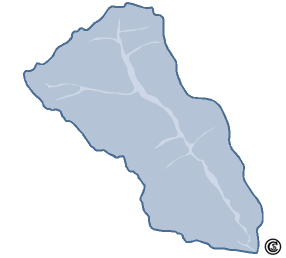Planning units
Planning can be done for several area units. You can plan for a block of houses, a municipality or for a forest area. These possible units are termed planning units. These are basically divided according to two criteria:
- administrative aspects: planning units are delineated according to administrative boundaries. In general, the global, national, district and communal (local) levels are differentiated. If the regional level is addressed it can be confined according to administrative or natural points of view.
- natural aspects: delineation of planning units according natural factors – forest areas, mountain regions or watersheds, for example.
The selection of a planning unit depends on what is to be planned. If you want to plan the provision of a telephone net for a community, the communal level is the most appropriate one – an administrative planning unit. If you want to plan natural resource management for the benefit of the people the Watershed Management approach assumes that the watershed is the most reasonable planning unit – a natural planning unit (see figure). Other planning approaches assume other planning units; Rural Regional Development is based on regional planning units.
What a watershed is and why it is a reasonable planning unit will be explained in the following chapter ‘Watershed Management as a planning approach’.
